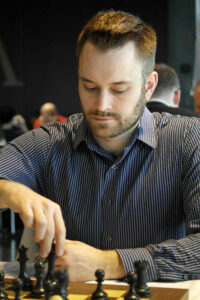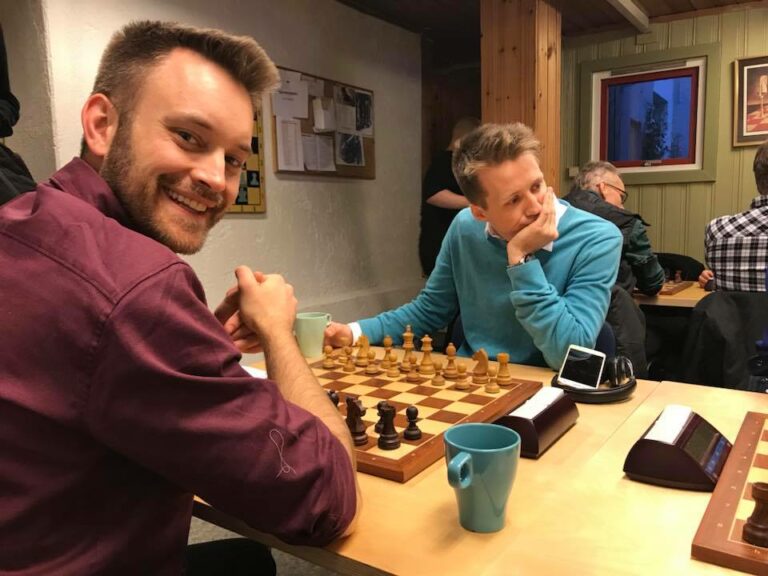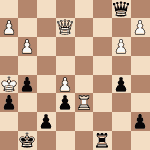Forty-six SparkChess readers had questions for chess celebrity International Master John Bartholomew. I (Alexey Root) decided that the questions from Chip Moore, Rob, malacor17, Kyle, and Gene ZB were the best ones. All five readers received one-year Premium Live SparkChess memberships. Read on to find out which of the five also won a three-month PRO membership to Chessable and for John Bartholomew’s answers to each question.
Chip Moore asked: With the growing popularity of chess on line, has John ever considered combining forces with other popular streamers (chessbrahs, GingerGM, penguingm1, etc.) to create a network for a more centralized place for folks to connect and follow along and show support (financial or otherwise)?

John Bartholomew answered: That’s an interesting idea, Chip, and I’ve considered something similar in the past. It would be neat to create a platform where streamers can interact directly with fans, and fans can support streamers via different means, e.g. contributing to a match prize fund, paying for a rapid game with video commentary, requesting videos on a certain theme, etc. Also, it would be fantastic to have forums on such a site moderated by each streamer with his or her type of content at the core. For example, “my” forum would focus on chess improvement, and I’d encourage users to post questions related to getting better at the game. Guys like the chessbrahs, on the other hand, may get questions like “what sort of techno sets do you suggest for playing bullet chess?”! ? I foresee this being a wonderful addition to the chess community. If anyone is interested in partnering with me on building such a platform, we should talk.
Rob asked: Hey John.
- Would you prefer it if chess engines had never been invented?
- Do you think people who only play internet chess can call themselves “chess players,” or do you think that you need to play “over the board” and actually look your opponent in the eye, shake their hand etc. before they’re truly “chess players”?
- On your channel you haven’t played the modern against d4 with an early Nc6 in years, so will you publish it as an opening book on Chessable?
I’d love to go back in time and experience chess and chess improvement when Grandmasters were the highest authorities
John answered: 1. Interesting question about chess engines. I wouldn’t go so far as to say that I wish chess engines had never been invented, but I’d *love* to go back in time and experience chess and chess improvement when Grandmasters were the highest authorities. I got into chess seriously in the late 1990s, and already by then Deep Blue had defeated Garry Kasparov and you could gradually see how engines were becoming the Oracle. It’s a bit sad when you read enchanting game commentary by players like Mikhail Tal and Bent Larsen and realize that anybody with an engine can point out flaws in their blood, sweat, and tears analysis. There’s a level of mystery and reverence for chess mastery that has – rightly or wrongly – disappeared with the rise of 3000+ rated engines.
2. I consider anyone who has taken the time to study and appreciate the game a “real” chess player. The medium in which they achieve that matters far less, in my opinion. That said, I think a “real” chess player also takes pleasure in at least occasionally pushing around the pieces on a physical board! I’ve organized meetups in Boston, Oslo, and England because I think every player should experience the delightful social elements of the face-to-face, over-the-board game.
3. The Modern has been a nice change of pace for me, but I’m still learning it. If I ever master it and have something new to offer, I’ll consider writing a Chessable repertoire!
malacor17 asked: Hey John! With your work as a chess coach, have you noticed any tendencies for which strategic elements club level players tend to struggle with? For example, color complexes or space, etc. Or is that something that varies player to player?
John answered: It varies from player to player, but here are a couple themes that lower-rated players find difficult to grasp:
You don’t always have to be making the most aggressive or straightforward move in a position to be making progress
- Useful moves that don’t outwardly “do” much. The classic example is a move like h2-h3 shortly after you’ve castled kingside, making “luft” for your king. Club players often just view these kind of moves as useless/unproductive and therefore won’t consider them, but a higher-rated player senses when they’re appropriate. You don’t always have to be making the most aggressive or straightforward move in a position to be making progress! Space-gaining moves in late middlegames and endgames fall under this category, too.
- Knowing which pieces to trade and which pieces to keep, especially when it comes to minor pieces (bishops and knights). Stronger players sense which pieces should remain on the board and which ones should be traded, and this often underlies their play. Weaker players usually aren’t capable of abstracting like this, so the trades in their games tend to be more haphazard or coincidental.
Kyle asked: Hi John! I’ve been a channel viewer and casual chess player for over a year now. Your videos have been really informative and one of the biggest causes of my improvement since I started playing. My question to you is about chess coaching. Do you have any strategies that you use to facilitate learning or keep students engaged that can also be applied to all forms of education? Additionally, do you think coaching other chess players has made you stronger at the game? If so, how? I am interested in your responses because I believe strongly in the power of education and may want to pursue it as a career, although it still may be a bit early to make that determination. I also tutor younger students in math to get a bit of money, and I’m always looking for ways to get better at it. Keep up the awesome work! Thanks John!

John answered: That’s great to hear, Kyle! I’m spoiled because I mostly work online with students who are already fascinated by chess, and I therefore don’t have to “sell” the game much to keep them engaged ? When I teach in schools, however, I like to engage the students as much as possible. Simuls, material-odds games (can you beat me up a queen!? $1 if you do!), cool/unusual tactics or puzzles, etc. are all great ways to cultivate a student’s interest in chess. The absolute worst thing to do is lecture new or aspiring chess players too much or focus on technical aspects of the games; active, hands-on learning should always be preferred. You might turn a new player completely off if you lectured them for an hour on the nuances of R+P vs. R and cited works like Dvoretsky’s Endgame Manual! If you, say, created a fun challenge where the defenders of that ending (with the R) were all on a team, and the attackers (R+P) were on another team, that could be far more effective.
As far as coaching impacting my play, I think it has had a largely neutral effect. I know people claim that coaching lower-rated players makes you weaker, but I don’t believe this – especially if you’re training and working on your own game as normal. It’s difficult to imagine coaching making you stronger, however, unless you’re working with extremely good students (perhaps even stronger than you). Hope that helps. Best of luck with your teaching aspirations.
Gene ZB asked: Hi John, I am an older, novice chess player (<1000) and thinking about hiring a chess coach to improve my play. Would you recommend investing in a coach for someone at my level? And, if so, what are some of the important qualities i should look for? Thanks and looking forward to more videos in your chess fundamentals series on your YouTube channel!
John answered: Thank for following my YouTube content, Gene! Yes, especially as an older, beginning player, a coach would be a wise investment. If you’re focusing on regularly playing longer games (minimum 15 minutes per side with an increment; longer games than that are even better), then you ought to have plenty of material for you and your coach to discuss. A good coach will quickly identify major areas where you’re making mistakes (at the 1000 level these will be apparent) and work to correct them with you. You could forego a coach and utilize the plethora of online resources, but an older player may especially benefit from directed, person-to-person advice. If you find a qualified coach within your budget who will take the time to look at your games in advance of your lessons (this would be the most important quality I’d look for), help you set and attain reasonable goals, and perhaps even provide you homework in-between lessons, I’d take the plunge.

Thanks to International Master John Bartholomew for his answers to the five readers. And thanks to the 46 SparkChess readers who left comments and questions for John. John chose malacor17 to win the three-month PRO Chessable membership. If you have a topic that you would like me (Alexey Root) to cover in a future article for SparkChess, please leave a comment below.
